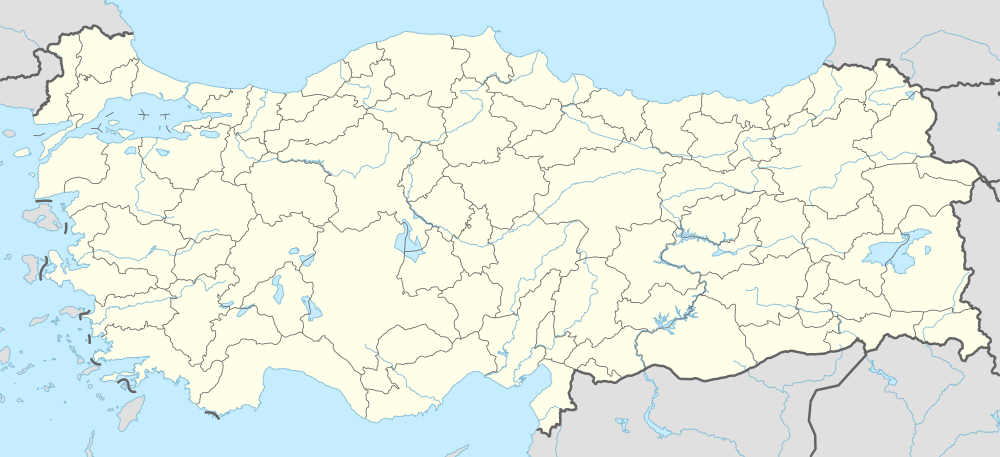Nuclear energy in Turkey
Turkey has no nuclear power plants but the first is expected to come online in 2020.[1] In addition to these, the government has announced intentions for three further nuclear power plants with four reactors each, as part of 100 GWe required by 2030.[2]
Regulation and policy
In 2007 a bill concerning construction and operation of nuclear power plants and the sale of their electricity was passed by parliament. It also addresses waste management and decommissioning, providing for a National Radioactive Waste Account and a Decommissioning Account, which generators will pay into progressively.[3]
The International Atomic Energy Agency (IAEA) has recommended "enacting a law on nuclear energy which establishes an independent regulatory body and putting a national policy in place that covers a wide range of issues, as well as further developing the required human resources".[4]
Akkuyu Nuclear Power Plant
In May 2010, Russia and Turkey signed an agreement that a subsidiary of Rosatom would build, own, and operate a power plant at Akkuyu comprising four 1,200 MWe VVER1200 units. The first reactor is expected to enter service in 2018.[5] In February 2013, Russian nuclear construction company Atomstroyexport (ASE) and Turkish construction company Özdoğu signed the site preparation contract for the proposed Akkuyu Nuclear Power Plant. The contract includes excavation work at the site.[6]
The official launch ceremony took place in April 2015, and the first unit is expected to be completed in 2023.[1]
It will be the first build–own–operate nuclear power plant.[7]
Sinop Nuclear Power Plant
On 3 May 2013, the then Turkish prime minister Recep Tayyip Erdoğan and his Japanese counterpart Shinzō Abe, signed a deal over US$22 billion for the construction of the Sinop Nuclear Power Plant that will be carried out by a joint venture consortium of Japanese Mitsubishi Heavy Industries and French Areva.[8] The Atmea reactor will be used.[9]
Mitsubishi Heavy Industries and Itochu, having top-level safety knowledge and experience against earthquakes, will build the power plant, which will have a capacity of around 4,800 MWe by four pressurized water reactors (PWR). The nuclear plant will be operated by the French electric utility company Engie. According to a goodwill agreement, the Turkish Electricity Generation Corporation (EÜAŞ) will have 20-45% shares in the nuclear plant.[8]
It is projected that the nuclear plant's first unit will be active by 2023, and the last unit enter service by 2028.[8] Construction is expected to start in 2017.[1]
İğneada Nuclear Power Plant
Turkish Minister of Energy and Natural Resources, Taner Yıldız have announced that the government is working on the plans of the third nuclear plant, which is projected to be built after 2023 under the management of Turkish engineers.[8]
In October 2015 it was announced that İğneada had been selected as the third site. Technology will come from US based firm Westinghouse Electric Company in the form of two AP1000 and two CAP1400.[9][10]
Opposition
There have been anti-nuclear protests in the past, for example in April 2006, plans to build a nuclear reactor on the Ince peninsula caused a large anti-nuclear demonstration in the Turkish city of Sinop.[11] Greenpeace, who have expressed concerns over earthquakes and the ability of the authorities to protect the public, have opposed these proposals.[12]
See also
References
- 1 2 3 "Smirnov: Akkuyu Nükleer Santral inşaatı 2018'de başlayabilir". World Nuclear News. 15 April 2015. Retrieved 19 April 2015.
- ↑ "Nuclear Power in Turkey".
- ↑ "Emerging Nuclear Energy Countries". World Nuclear Association. April 2009. Retrieved 22 April 2009.
- ↑ "IAEA Delivers Report on Nuclear Power Development to Turkey".
- ↑ "Russian plant for Turkey's Akkuyu". World Nuclear News. 13 May 2010. Retrieved 31 May 2010.
- ↑ "Russia And Turkey Sign Akkuyu Site Preparation Contract". NucNet. 22 February 2013. Retrieved 3 April 2013.
- ↑ "How They Do It: Turkey".
- 1 2 3 4 "Turkey, Japan sign $22 bln deal for Sinop nuclear plant". Hürriyet Daily News. 3 May 2013. Retrieved 4 May 2013.
- 1 2 http://www.world-nuclear.org/info/Country-Profiles/Countries-T-Z/Turkey/
- ↑ http://www.novinite.com/articles/171329/Turkey+Plans+to+Build+Nuclear+Power+Plant+Close+to+Border+with+Bulgaria
- ↑ "Thousands protest Turkey's plans to build nuclear power plant", AP Worldstream, 29 April 2006 (retrieved 2010-11-08, 0410 UTC).
- ↑ Greenpeace protests at Turkey's nuclear power plant
External links
- Nuclear Power in Turkey, World Nuclear Association
- A Study on the Security and Safety Aspects of Switching to Nuclear Power in Turkey
